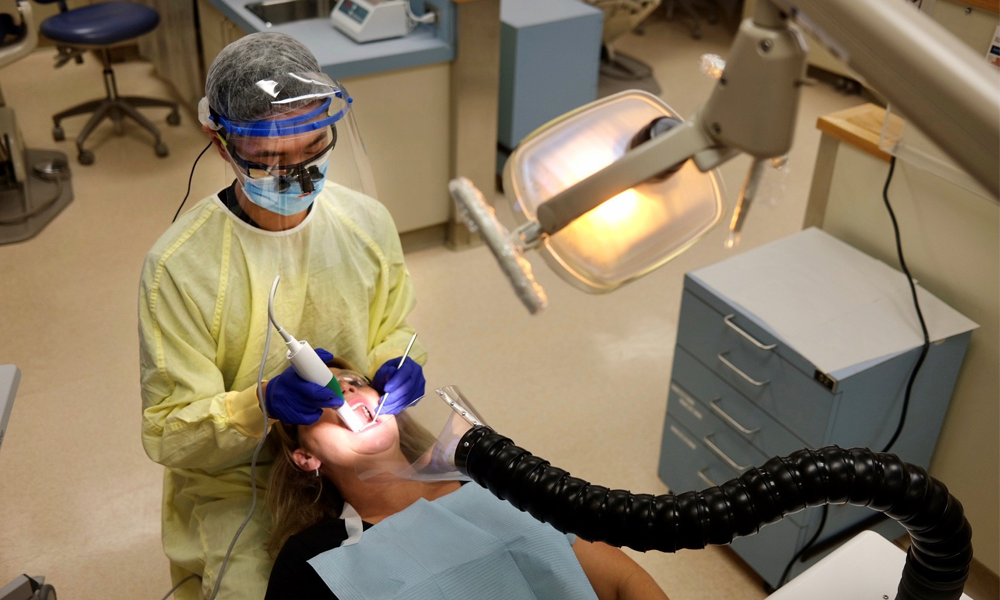
As part of infection-control measures, UM dental students now use high-volume evacuator systems to vacuum away aerosols produced during some procedures.
Saliva samples from UM dental personnel to aid COVID-19 research
Students, faculty and support staff in dentistry and dental hygiene at UM will soon be asked to contribute their saliva to a research study of COVID-19 at Canada’s 10 dental schools.
Those who volunteer to participate will submit monthly samples of their saliva for analysis and complete a monthly online questionnaire. The study will run until the end of 2021.
Any participant who tests positive for COVID-19 will be asked to provide additional saliva samples so their immune response to the disease can be tested for a month post-infection.
“All of Canada’s 10 university dental schools operate clinics and labs because it’s essential for students in dentistry and dental hygiene to gain practical experience with real patients,” says Dr. Bob Schroth, professor of preventive dental science in the Dr. Gerald Niznick College of Dentistry and of pediatrics/child health and community health sciences in the Max Rady College of Medicine.
Schroth, a dentist and clinician-scientist who is also a researcher with the Children’s Hospital Research Institute of Manitoba, is the UM project lead for the study.
“Tracking the incidence of COVID-19 among students, faculty and support staff while we’re providing oral health care in these university clinics will produce valuable data,” the professor says.
“We’ll be able to analyze whether differences in infection-control protocols among the clinics across Canada affect infection rates. We’ll also investigate whether specific occupational roles and sociodemographic backgrounds put people working in university-operated clinics, labs and offices at higher risk of infection.”
The study is led by Dr. Paul Allison, professor of dentistry at McGill University. It received $1.4 million from the COVID-19 Immunity Task Force, a Government of Canada-funded body that brings together university, hospital and public health expertise to map the scope of coronavirus infection in Canada.
Participants will receive self-testing kits that use a swab for collecting saliva. The samples will be collected locally and then sent to the Salivary Proteomics Research Laboratory at the University of Saskatchewan College of Dentistry. Sample material that remains unused will be stored in a salivary biobank for future research use.
Because the research team is conducting a similar study of COVID-19 infection rates among practising Canadian dentists, the data from the dental schools can be compared with the results for community dentists.
The researchers will analyze the data every two months so that as findings emerge, dental schools can take action to change infection-control protocols if necessary.
Although it’s likely that many students, faculty and staff will be vaccinated against COVID-19 before the end of the year, Schroth says the research is still valuable. “From what we can see, this pandemic is not ending anytime soon,” he says. “The project team will gather additional data by assessing the immune response of participants who receive a vaccination.”
The project will start enrolling participants soon. Schroth hopes to see about 40 students and 40 clinical staff, including faculty, from the Dr. Gerald Niznick College of Dentistry and School of Dental Hygiene take part. Across Canada, about 800 participants are expected to enrol in the study.
“Our students, faculty and staff know that our clinics have already implemented very stringent infection-control measures,” Schroth says. “By participating in this study, they’ll contribute to research that will be used to make dental clinic working conditions even safer.
“The findings will also add to general knowledge about the disease and how it is transmitted in a frontline health-care setting.”






